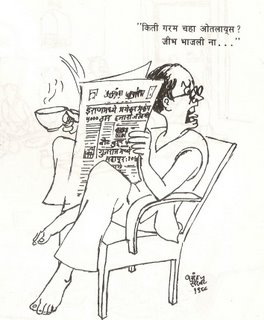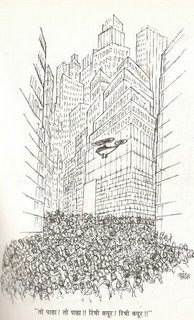Vasant Sarwate वसंत सरवटे remains one of the most under-rated cartoonists in India. Maybe because he has primarily contributed to Marathi publications.
His art has been moving me for more than three decades now.
I have selected two pictures here to represent him. More may follow.

First picture (1968) pokes fun at middle class ethos of Maharashtra, India as effectively as other literary masters of 20th century like the late Shri Kru Kolhatkar, Chi Vi Joshi and Pu La Deshpande did. And in far fewer words.
Man has just sipped his tea which perhaps is hotter than usual and it has given him a sore tongue. He admonishes his wife (not in the picture) why she poured such a hot cup. Picture becomes so poignant because the broadsheet he is reading has these news-items: "A quake in Iran kills 5,000 and injures thousands", "floods in Gujarat killing hundreds", "Boat capsizes" etc! Even reading of these catastrophes has not made a dent on our Marathi speaking Homer Simpson's sensitivity. He remains just like HIM.

Second picture is from 1974 (33 years ago!) and brings out visionary qualities of good art.
Architects and urban planners like Charles Correa had opposed expansion of Mumbai into Arabian sea. They saw what would become of Mumbai. But no one 'saw' it better than Sarwate.
Picture shows few in the crowd spotting Bollywood actor Rishi Kapoor flying over them in a helicopter and are shouting his name.
Picture captures beautifully what was eternal in Mumbai- her glamour manifested mainly through film industry and what was changing- her physical landscape, getting perhaps uglier.
No comments:
Post a Comment